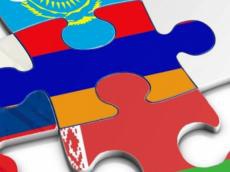|
|
TODAY.AZ / Analytics
Experts warn about consequences of Armenian’s joining to EEU
21 October 2014 [16:50] - TODAY.AZ

/AzerNews/
By Mushvig Mehdiyev
Armenian President Serzh Sargsyan's decision to join the EEU has sparked mixed reactions in the country since September 2013.
Analysts, political experts and even ordinary citizens viewed the decision as a U-turn in Armenia's foreign policy. It came after three years of mutual works to prepare an association agreement with the EU.
Now, the local and foreign economic experts warn that Armenia's economy will bear the brunt of the membership in the Eurasian Economic Union.
"Entering into the EEU could trigger inflation," Head of the non-government organization Consumer Advice Center, Karen Chilingaryan said on October 20.
He noted that customs duties on import from the non-EEU countries will increase to the common customs tariffs of the EEU and it will subsequently accelerate the inflation. "If we currently have customs taxes not higher than 10 percent, the tariffs can rise to the EEU rates after getting the membership," Chilingaryan added.
Armenia's National Statistics Service reported the inflation rate in the country was 2.9 percent in January-September of 2013. Armenia's trade deficit in the same period amounted to over $ 2,082 million.
Armenia's membership at the Eurasian Economic Union was officially confirmed by the Supreme Eurasian Economic Council in Minsk on October 10. Heads of the EEU member-states - Russia, Kazakhstan and Belarus signed the agreement on Armenia's joining the alliance.
Armenia's membership at the EEU will come into force from January 1, 2015 after the parliament ratifies the agreement signed in Minsk. Meanwhile, the alliance's member-states have postponed the use of high customs duties for Armenia for several years.
External debt
The ongoing economic crisis in the country is reportedly affecting the country's external debts. Armenia regularly receives foreign loans from several financial institutions. Now, the fashion is going to change amid the possible rise of inflation in the wake of the EEU joining. Armenia's increasing exports to Russian markets, as well as lack of internal sources of finance ignites its eagerness to receive more external money for healing the open wounds.
The draft state budget reads that Armenia's total external debt will be calculated at $4,129 billion by the end of 2015. The economic forecasts claim that the external debt's amount will be almost $4 billion this year by exceeding the last year's figure about $59 million.
The government is seemingly trying to ease the domestic problems by means of external loans. Diminishing remittances from the overseas and widespread unemployment are watering the mill of threatening problems in Armenia.
No job means no money, while no money means a hard effort to survive in today's world. Jobless and poor people in the South Caucasus country jointly constitute almost 50 percent of the whole population. The figure is the reflection of a deafening SOS signal in Armenia.
Failure to keep pace with modern world
Local media in Armenia think that the membership at theEEU will keep the country back from developments in the modern world. Despite lack of economic perspectives, the EEU joining will not strengthen Armenia's security. It will take the same steps with the countries which fail to keep the pace with the modernizing world in many fields.
"Armenia will reveal its evil inclinations within the EEU. Unfortunately, none of the political forces in the country dares to call the membership at the Russia-led alliance a mistake," Aravot newspaper wrote.
The EEU conundrum continues to drag Armenia into complicated circumstances. The authorities and the population can not shake hands to jointly welcome the membership at the union. Members of the ruling cabinets think of their benefits and safety, while the ordinary people are concerned about their lives threatened by a number of challenges.
URL: http://www.today.az/news/analytics/137141.html
 Print version
Print version
Connect with us. Get latest news and updates.
See Also
- 07 November 2024 [20:45]
From press to politics or sympathy to hatred: Gallup's downbeat survey on Pashinyan's rating - 01 November 2024 [11:05]
Sustainable development is one of goals of COP29 - 31 October 2024 [13:50]
New trains, green lanes: Azerbaijan's journey to COP29 readiness - 28 October 2024 [17:10]
Lukewarm wishes from Yerevan - How sincere is Pashinyan in congratulating his Georgian counterpart? - 25 October 2024 [09:00]
Azerbaijan expands IFC partnership to enhance energy efficiency and sustainable development - 24 October 2024 [16:54]
Georgia under Western pressure - 23 October 2024 [13:28]
Azerbaijan becomes leader of Central Asia-Europe energy corridor - 23 October 2024 [08:30]
SOCAR's sustainable initiatives ahead of COP29: Paving way for carbon-neutral future - 22 October 2024 [19:57]
Islamophobia in France – Policy continuing since 20th century - 22 October 2024 [08:30]
Azerbaijan makes headway with loan projects boosting reconstruction in liberated areas
Most Popular
 Dashnaks Influencing the European Parliament and Threatening EU Leadership
Dashnaks Influencing the European Parliament and Threatening EU Leadership
 Armenia sends resumed package of peace proposals to Azerbaijan
Armenia sends resumed package of peace proposals to Azerbaijan
 Donald Trump's victory, Macron's hypocrisy and President Ilham Aliyev's indisputable arguments
Donald Trump's victory, Macron's hypocrisy and President Ilham Aliyev's indisputable arguments
 “Chinghiz Aitmatov” Order bestowed upon President Ilham Aliyev in Bishkek [PHOTOS]
“Chinghiz Aitmatov” Order bestowed upon President Ilham Aliyev in Bishkek [PHOTOS]
 Azerbaijani carpet expert awarded in South Korea
Azerbaijani carpet expert awarded in South Korea
 Armenia Challenges the West's Influence
Armenia Challenges the West's Influence
 President of Azerbaijan Ilham Aliyev arrives in Kyrgyzstan [PHOTOS/VIDEO]
President of Azerbaijan Ilham Aliyev arrives in Kyrgyzstan [PHOTOS/VIDEO]
